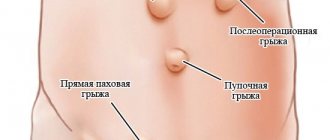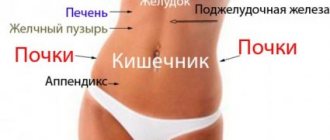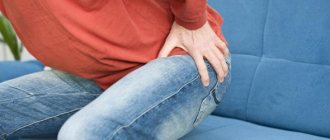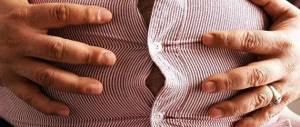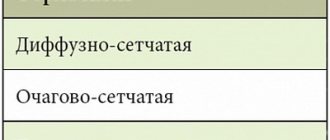Constipation, its types, symptoms
Constipation is a condition of difficult, unsystematic bowel movement. Many people believe that the lack of daily bowel movements is nothing more than constipation.
However, the tendency of the human body to have bowel movements 3 times a week is a variant of the norm.
Why do women experience constipation? How to recognize constipation and start treatment in a timely manner? Answers to these and a number of other questions will allow you to identify the disease at an early stage and defeat it without resorting to surgical intervention.
The occurrence of constipation is directly proportional to lifestyle, food consumed, and the presence of bad habits. The disease comes in two types: acute (occurring against the background of inflammatory processes and having a short course) and chronic (characterized by persistence).
Types of Constipation
Constipation is classified depending on the causes of its occurrence. There are different types of constipation:
- Hypodynamic (occurs due to lack of sufficient mobility).
- Proctogenic (appears against the background of hemorrhoids).
- Endocrine (diagnosed in women with thyroid diseases).
- Toxic (associated with poisoning of the body with toxins).
- Mechanical (provoked by mechanical damage, intestinal injuries).
- Medicinal (occurs when there is an overdose of drugs).
At the first signs of constipation, it is important for women to pay attention to the causes contributing to the disease. This will allow you to choose the right treatment in the future and prevent complications.
The first signs of the disease are:
- absence or scanty amount of bowel movements;
- dehydration, hard stool;
- feeling of incomplete bowel movement.
Women may experience all the signs of the disease, as well as some symptoms separately. In any case, even two of the above symptoms (be it a change in the frequency, quantity, rhythm of bowel movements, or the amount and consistency of feces) is an indicator of constipation.
Complications and consequences
Rare and painful bowel movements lead to coprostasis - hardening of the stool. Because of this, accompanying complaints and symptoms develop, which are combined into chronic constipation syndrome. With coprostasis, the following symptoms occur:
- Attempts.
- Pain during bowel movements.
- Bleeding from the anus.
- Hemorrhoids and fissures.
- Bloating.
- Loss of body weight.
- Nausea and poor appetite.
“Paradoxical diarrhea” or fecal incontinence is often observed when, against the background of constipation, spotting, greasy stool is released. This is due to the fact that a new portion of feces flows around hard feces and comes out freely due to dysfunction of the sphincter. In severe cases, feces block the intestinal lumen in a certain area, causing intestinal obstruction or tissue rupture. If feces enter the abdominal cavity, peritonitis develops.
Causes of constipation in women
What causes constipation in women? Typically, such a misfortune occurs due to disruption of the processes of formation and movement of feces through the intestines. This is what can be identified as the main causes of the disease.
Almost all women suffer from constipation after severe stress, surgery, or travel. They are not a pathology and disappear a week after returning to a normal lifestyle.
If constipation does not go away for a long time, often recurs or becomes habitual, examination by a doctor and comprehensive treatment are required.
The most common causes of constipation in women are:
- disturbances in the functioning of intestinal muscular motility;
- different volumes of intestinal contents and colonic capacity;
- absence or delay of the urge to defecate;
- pathological conditions of the intestine or adjacent organs that interfere with the normal movement of feces;
- nervousness;
- diseases of the endocrine system;
- circulatory disorders;
- long-term use of medications;
- violations of the daily routine;
- lack of proper sleep;
- long sedentary work;
- intestinal inflammation;
- stressful situations;
- oncology;
- neurological disorders;
- spinal injury;
- menstrual irregularities;
- disruptions in the functioning of the pelvic floor muscles;
- frequent delays in bowel movements;
- unbalanced diet;
- lack of fiber-rich foods;
- dehydration of the body.
Should constipation be treated?
Although constipation is a symptom of a disorder in the body and not a disease, diagnosis and treatment are necessary.
Dangers of regular constipation caused by lifestyle and dietary habits:
- development of an imbalance of intestinal microflora (dysbacteriosis), which provokes a decrease in local and general immunity, disrupts digestion processes, and causes deficiencies of vitamins, microelements, and nutrients;
- dysfunctions and diseases of the gastrointestinal tract (diverticulosis, hemorrhoids, inflammatory processes, etc.);
- intoxication of the body due to prolonged presence of feces in the intestinal cavity;
- formation of polyps, intestinal tumors;
- intestinal obstruction.
Symptoms of the disease
Symptoms of constipation in women are very diverse and largely depend on the causes and duration of the disease.
The disease may be accompanied by visible changes in the skin: it changes color and becomes flabby, less elastic, pale, and sometimes has a yellowish tint.
Later noted:
- heaviness in the lower abdomen;
- bad breath;
- hard dehydrated stool;
- lack of appetite;
- prostration;
- unpleasant taste;
- headache;
- nausea;
- muscle pain;
- difficult acts of defecation;
- heartburn;
- frequent rumbling in the intestines;
- bloating;
- sudden mood swings.
With chronic constipation, defecation occurs rarely (maybe 3 times a week, 1 time in 7 days, or even less often). The feces are hard, dry, consisting of dark, adjacent lumps, sometimes with admixtures of blood.
Causes of chronic constipation
Constipation can occur as a symptom of other illnesses, but it is not always associated with illnesses. The causes of chronic constipation include:
- Lack or lack of physical activity
- Abundance of harmful foods on the menu
- Lack of fluid in the body
- Nervous disorders
- Stress, depression
- Frequent moves
- Laxative abuse
All these factors can cause disruption of the normal functioning of intestinal motility. Failure of rhythmic muscle contractions in the intestines leads to difficulty moving stool and constipation. Constant disturbances in the digestive system lead to chronic constipation.
Constipation is often accompanied by irritable bowel syndrome, which disrupts the muscular movement of the digestive tract and interferes with the regularity and consistency of stool. Feces come out in small portions, leaving a feeling of heaviness in the stomach. Constipation is often replaced by diarrhea.
Chronic diarrhea can be caused by intestinal pathologies: mother-in-law's anus, hemorrhoids, pararectal abscess, tumors, volvulus. Sharp pain that occurs during bowel movements in patients with intestinal pathologies causes fear of bowel movement. This disrupts the bowel movement, leading to overflow of the intestines with feces.
Treatment of constipation
Drug treatment of constipation is aimed at stimulating intestinal motility by influencing the chemical composition of the laxative drug.
The most common laxatives include lactulose, castor, sunflower, olive oils, aloe, horse sorrel juice and root, and hay.
Their laxative effect has a fast-acting effect, however, frequent use of laxatives is fraught with addiction, decreased receptor sensitivity, and electrolyte imbalance.
Attention! Some of them are prohibited during pregnancy! You can read about laxatives during pregnancy here.
Laxatives based on salt composition (mineral waters, salt baths, preparations containing magnesium and sodium sulfates) mechanically irritate the intestines due to liquefaction and swelling of the chyme.
Traditional medicine offers a lot of remedies to combat constipation, the effect of which is based on softening the stool.
Traditional medicine should be used with caution for intestinal inflammation. Medicinal preparations are contraindicated for women with uterine bleeding, colon obstruction, kidney problems, or side effects after drug treatment.
If symptoms such as chills, fever, vomiting appear, you should immediately consult a doctor.
If folk remedies and medications do not help cope with constipation, women are recommended to undergo a cleansing enema. This procedure is contraindicated in case of inflammation and damage to the anus or rectum, in the presence of hemorrhoids, or rectal cancer.
The result will not take long to wait - literally after 10-15 minutes the urge to defecate is noted.
Diet for constipation in women
If constipation is caused by acclimatization or stress, usually after 1.5-2 weeks it goes away on its own. If the problem occurs periodically, women are advised to consume crushed fiber along with their main food (sold at the pharmacy), a few apples, 100 g of dried fruit, or drink a glass of freshly squeezed vegetable or fruit juice or kefir before bed.
If the methods for relieving constipation presented above do not give a positive result, you can use a laxative.
Olive, sunflower or castor oil is suitable as a laxative. In the morning on an empty stomach, half an hour before breakfast, it is advisable to take 1 tbsp orally. a spoonful of any oil.
If for some reason you don’t like the oil, the laxatives Duphalac, Senadexin, Senade, etc. will come to the rescue.
Often constipation in women occurs due to a change in diet, hardness of the water consumed, and a sedentary lifestyle. In such cases, you should avoid eating sweets, flour, strong drinks, and chocolate in favor of salads, cereals rich in fiber, stewed, baked vegetables, and fermented milk products.
Recommended laxative mixtures
Figs, prunes, dried apricots in equal quantities are washed, ground in a meat grinder, mixed, combined with honey (100 g) and aloe juice (50 g).
The prepared mixture is infused in the refrigerator for a day and taken 1 spoon in the morning and evening as a snack spread on rye bread. Take it with water or kefir.
For constipation, it is useful to brew rye bran and add it to food.
Sea kale copes well with the disease. Having a laxative effect, daily consumption of 150 g of kelp can permanently relieve the problem of constipation.
In the chronic stage, drug treatment is indicated. Medicines should be taken infrequently and strictly under the supervision of a doctor, otherwise disturbances in the intestinal microflora and exacerbation of the disease are possible.
7-day diet plan for constipation
The product included in this diet can restore the urge to defecate within a week. The diet begins with fluid intake. Every day a woman should drink at least 2 liters of water.
Monday
- A cup of water after waking up;
- for breakfast, yogurt with cereals, 1 kiwi, tea or coffee with milk;
- for lunch, a salad of peas and leaves of any salad, plus boiled fish with pine nuts, 100 g of strawberries;
- For dinner, yogurt, spinach puree, or an omelette with mushrooms and champignons.
Tuesday
- Water before breakfast;
- breakfast is the same as on the first day;
- for lunch, carrot-pineapple salad, boiled meat stuffed with plum puree, cottage cheese with nuts;
- for dinner, boiled brown rice, stewed with vegetables, salad with peas, kiwi and squid, yogurt.
Wednesday
- Water in the morning;
- breakfast is the same;
- for lunch it is useful to eat spaghetti with finely chopped raw tomatoes, yogurt, stewed white fish, seasoned with sauce and onions;
- for dinner a sandwich with black bread, ham and tomato, spinach with pine nuts and raisins, pineapple.
Thursday
- Water after waking up;
- breakfast is the same;
- for lunch, vegetable salad with tuna, vegetable stew or puree, 100 g of plums;
- for dinner, mashed potatoes with baked beets, zucchini omelette, nuts.
Friday
- Water;
- breakfast, as in previous days;
- for lunch, baked eggplants, rabbit or turkey meat, yogurt with cereals;
- for dinner, a salad of tomato, watercress leaves, corn, boiled fish with raisins, freshly squeezed strawberry and kiwi juice.
Saturday
- Water;
- breakfast is the same;
- for lunch, stewed brown rice with seaweed, steamed fish with olive oil, fruit;
- for dinner, light tomato and asparagus salad, eggplant omelette, yogurt.
Sunday
- Water early in the morning;
- breakfast is the same;
- for lunch, lentil-tomato salad, curdled milk, tuna, raisins;
- for dinner, a salad of cheese, kiwi, fresh tomato, turkey meat stuffed with plums and raisins, yogurt.
If your stool does not return to normal after this diet, you should consult a doctor.
Folk remedies for constipation in women
Home treatment with folk remedies is effective in the early stages of the disease. The following mixtures will help you quickly get rid of constipation:
- Take 1 tsp orally in the morning on an empty stomach. castor oil.
- Drink half a glass of syrup made from rowan fruits every day before breakfast. To do this, the fruits are placed in a jar and sugar is sprinkled on top. Let it brew for a month, after which the syrup is drained, diluted with alcohol in a ratio of 1:20 and taken orally.
- Drinking burdock infusion (effective for chronic constipation). For cooking use 1 tsp. burdock root and 0.2 liters of water. You should drink ½ cup three times a day before meals.
- Herbal mixtures of nettle, buckthorn and yarrow (2:3:1); hay, joster, anise, buckthorn, licorice root (1.5: 1.5: 1.5: 1: 1.5); yarrow, buckthorn and nettle (1:3:1).
- A mixture of chamomile, flax seeds and oak bark (40 g, 30 g, 30 g).
- Fruit and herbal collection of mint, fennel, valerian root and chamomile (2:1:1:6).
- Herbal mixture of valerian root, buckthorn, mint, motherwort (30 g, 20 g, 30 g, 30 g). An excellent remedy for chronic neurogenic constipation. 2 tablespoons of the collection are poured with boiling water (0.2 l), boiled for 30 minutes, then filtered through a strainer and diluted with another 200 ml of water. Take a glass daily at night before bed for a month. If necessary, the course is repeated.
Traditional medicine copes well with chronic constipation. Before taking any medications, you should first consult your doctor.
There will always be medicinal herbs that are right for you. After all, nature took care of their usefulness and accessibility.
Constipation in adults - treatment and prevention
To effectively treat constipation, first of all, you need to identify and eliminate the very cause of its occurrence.
If there are no reasons related to surgical intervention (polyps, tumors, etc.), then the very first thing that needs to be done is to establish a healthy and regular diet, include physical education (including therapeutic exercise) and sufficient physical activity during the day , use herbal medicine, massage and drink enough clean water, use folk remedies.
It is permissible to take natural remedies with a laxative effect, which will activate intestinal motility.
These are vegetable bran, pharmaceutical preparations of methylcellulose, seaweed (kelp), ground milk thistle seeds, boiled beets, beet juice, prunes, ground flax seeds.
Self-administration and regular use of most laxatives without medical supervision is dangerous!
Firstly, the body gets used to them and requires a constantly increasing dose. Over time, the intestines stop working on their own as they get used to regular stimulation.
Secondly, laxatives cause bloating, pain, upset stool (diarrhea), and also over time lead to liver and kidney diseases, allergies, remove from the body the vitamins and minerals it needs in large quantities, and also severely dehydrate the body. To treat constipation, doctors often prescribe probiotics, which are designed to normalize the intestinal microflora.
The effect of taking such drugs will be enhanced if the diet contains a sufficient amount of coarse fiber from fruits, vegetables, herbs, as well as sour berries.
For cracks and hemorrhoids, the doctor prescribes medicinal suppositories.
In order to prevent the occurrence of constipation, it is necessary to carefully monitor the condition of your intestines, their regular and timely emptying, promptly identify incipient gastrointestinal diseases, and also lead a fairly active lifestyle, it is enough to move in the fresh air, walk, drink enough water and eat healthy foods with enough coarse fiber.
It is very important not to get carried away with cleansing procedures in the form of frequent enemas, colon hydrotherapy and long-term use of pharmaceutical laxatives, especially without their prescription by a doctor.
Diet for constipation - what to eat for constipation?
First of all, it is necessary to increase the consumption of clean water and freshly squeezed juices.
- 1-2 glasses of warm water drunk on an empty stomach in the morning, as well as 1-2 glasses of freshly squeezed juice before breakfast (apple, orange, apple-beetroot, you can add lemon and carrot juice, celery and pumpkin juice are good for this purpose) start the bowel function well juice).
- It is recommended to consume porridge exclusively in the whole grain version, completely excluding instant porridge. The same goes for pasta - choose whole grain pasta.
- Be sure to eat more greens and raw vegetables. This is a “pill for the intestines”!
- Eat berries regularly, preferring those with a sour taste.
- Nutritionists recommend eating small meals about 3-5 times a day.
- It is very important to reduce the fat content of the food you eat. A healthy amount for an adult is no more than 3 spoons per day. In this case, one should take into account the so-called “hidden fats”, which are present in many food products, especially in sausages, pates, fast foods, etc.
- To naturally cleanse the intestines and establish its active functioning, it is recommended to spend cleansing and fasting days on raw vegetables, fruits, and freshly squeezed juices, be sure to enrich the daily diet with a large amount of greens and a sufficient amount of clean water.
- After such fasting fruit and vegetable days, the intestines begin to work with renewed vigor.
- If there are diseases and it is difficult for the body to digest raw vegetables, then it is permissible to use boiled, stewed and steamed ones, while simultaneously consuming a large amount of fresh juices.
- You should know that coffee dehydrates the body quite strongly, which over time leads to problems with bowel movements.
- It is necessary to strictly exclude the consumption of sugary carbonated drinks.
- It is very good to use mineral water, from which you first need to release the gas, as well as homemade vegetable kvass (cabbage, beetroot), and kombucha infusion.
- Fermented foods have proven themselves well, in particular sauerkraut and carrots.
Diet for atonic constipation
Nutrition for atonic constipation should be as “rough” as possible.
That is, containing a sufficient amount of coarse plant fiber. These are raw vegetables, fruits, herbs, cereal bran, whole grains.
It is recommended to completely eliminate or at least significantly reduce the amount of “fast carbohydrates” consumed (sweets, white flour products). Such foods significantly slow down digestion.
Important and healthy vegetables and fruits include apples, beets, carrots, cabbage, any greens, plums, and apricots. And also dried fruits (especially prunes, apricots, figs).
For cereals, give preference to buckwheat, pearl barley, and barley.
Diet for spastic constipation
For spastic constipation, doctors recommend boiled vegetables and pureed fruits.
It is necessary to exclude products with coarse fibers, as this can cause pain and worsen the condition.
It is best to puree all prepared dishes. Of the oils, preference is given to vegetable oils of the first cold pressing.
Meals for hypomotor constipation should contain daily:
- vegetables, fruits, berries, raw greens - about 200 g;
- prunes, dried apricots, figs - at least 10 pieces;
- vegetable oil - in an amount of no more than 3 tablespoons, of which one can be taken in the morning on an empty stomach;
- buckwheat, barley, pearl barley porridge;
- bran, which must be added to almost all dishes, and also taken along with juices and kefir. Daily intake of 30 g of bran speeds up the passage of feces through the intestines three times!;
- special varieties of bread - whole grain or with added bran;
- ground flaxseed - at least 30 grams per day, washed down with enough water or juice;
- mineral water – 500 ml. in a day.
Sample daily menu for chronic constipation:
- Breakfast - omelet, raw vegetable salad with a spoon of vegetable oil, fresh apple, herbal tea;
- Second breakfast – fruits, preferably apples, berries;
- Lunch – borscht or cabbage soup without meat with sour cream, boiled meat, boiled or stewed beets, salad of herbs and raw vegetables (you can use sauerkraut), dried fruit compote
- Dinner – vegetable stew, buckwheat, cottage cheese, herbal tea;
- At night, you can drink one glass of kefir or any other fermented milk drinks that the body accepts well.
Read more about nutrition for constipation in this useful article.
Consequences of constipation
This unpleasant disease has a number of even more unpleasant consequences:
- Long-term constipation in women can cause inflammation of the rectum or, even worse, secondary colitis.
- Prolonged stagnation of feces provokes pain in the rectum, as a result of which the development of paraproctitis, hemorrhoids, and rectal fissures is possible.
- There are cases when regular stool retention lengthens and expands the colon, aggravating constipation.
- Untreated constipation can lead to colon or rectal cancer. The constant stagnation of decomposition products in the intestines is fraught with the formation of large concentrations of accumulating carcinogens, the long-term effect of which on the intestinal walls contributes to the development of a malignant tumor.
That is why it is so important to seek help from a specialist, establish the cause of the disease and deal with it once and for all.
Prevention
Preventing constipation includes not only a healthy diet, but physical activity and proper use of antibiotics. The following exercises are effective for fecal retention:
- To strengthen your pelvic floor, while sitting or lying down, lift your knee as high as possible, hold briefly, and then slowly lower your leg. Repeat the exercise with the second leg. You need to do up to 10 such repetitions with each leg.
- To speed up the movement of stool, push your stomach. After inhaling, pull your stomach in and then “throw” it forward as you exhale. You need to repeat the exercise 5 times a day.
- Do self-massage to normalize intestinal tone. In the morning, while still in bed, gently massage your stomach along the colon for 10 minutes.
During antibiotic therapy, it is necessary to maintain the intestinal microflora with the help of probiotics, prebiotics and metabiotics. Metabiotic Actoflor-S is compatible with antibiotics and has an additional antimicrobial effect against harmful types of bacteria. It helps preserve beneficial flora, which may be damaged during antibiotic therapy.
лучшие шлюхи Чебоксары встречаются исключительно на своей территории, смотри wowcheboksary.ru. Все успешные мужчины уже давно оценили преимущества проституток города. Позитивные лучшие шлюхи Чебоксары, пылкие и страстные, они такие весёлые и профессиональные, что тебе обязательно повезёт. Прелестницы ждут тебя.
